
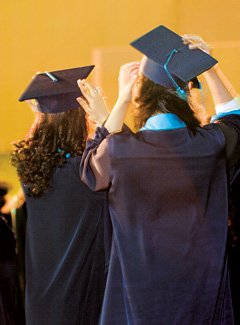 |
| In 2006, 53 graduates of Effat College donned caps and gowns before receiving their diplomas. Each graduate also received a red rose—a reminder, perhaps, that Princess Effat Al-Thunayyan was an avid rose gardener in her lifetime. |
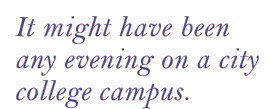
The buildings glowed pink in the sunset, sparrows twittered in the trees, and evening traffic echoed in the distance. Normally, at that hour, few students or faculty might pass by, yet that night, as the time of the evening call to prayer drew near, there were more voices than usual, punctuated by the clicking of many high-heeled shoes. It was graduation night at Effat College, Saudi Arabia’s first private college for women.
Fifty-three young women gathered, greeting friends in the traditional way of the Hijaz, western Saudi Arabia: one kiss on the right cheek, three on the left. They walked in groups along the shaded portico, past the swimming pool, to the air-conditioned basketball court. There, they put on silk baccalaureate gowns of turquoise and blue. A few had small children in tow. In the auditorium, mothers, sisters, aunts and cousins waited expectantly.
It was a moment that fulfilled a dream of the college’s founder, HH Princess Effat al-Thunayyan, whose husband, the late King Faisal ibn ‘Abd al-‘Aziz, ruled the country from 1964 until 1975. With the support of her children and a team of Saudi and international experts, she opened the college for women in August of 1999, just months before she died, capping a lifetime of advocacy for women’s and girls’ education.
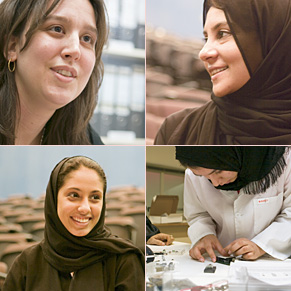 |
| Top left: Kerry Laufer, a Swarthmore graduate and now vice dean for institutional development and quality control, is one of the many Americans who have helped the college’s development. Top right: Zakia Bahejri graduated this year with a major in information systems, as did Nojoud al-Sihli (bottom left), who also served as president of the Marketing Club. Bottom right: Dima Ikhwan is studying engineering. |
From that beginning with 30 students, Effat College grew rapidly, setting as its goal the preparation of Saudi women to take up leadership roles in the new century, from the academy and the business world to the home and society at large. Taught by faculty from Saudi Arabia and more than a dozen countries, the college’s curriculum has grown in partnership with leading us institutions, including Duke and Georgetown universities and Mount Holyoke and Wilson colleges. By 2006, Effat College’s 250 students were choosing among nine majors, including business administration, psychology, architecture and engineering. All classes are taught in English, and the curriculum is designed around us liberal-arts models.
Effat College’s campus stands on Jiddah’s south side, near a water tower and the grounds of the old Khuzam Palace. The campus occupies part of the former grounds of Dar al-Hanan, the first private school for girls in Saudi Arabia, also founded by Princess Effat—often known affectionately as “Queen Effat”—in 1955. The college’s modestly modernist architecture, with open courtyards, a jewel-like private mosque and simple shaded walkways, appears to beckon inward, reflecting the college’s focus on character and leadership development.
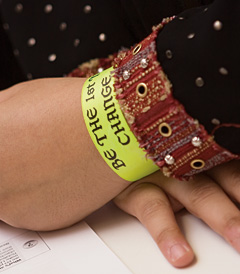 |
| “They are dedicated, organized and efficient… They are very keen to embrace the world, while at the same time being true to their identity and the identity of the land. I admire that combination,” says Dr. Ghazi Binzagr, who serves on the college’s advisory board. |
Within the curriculum, the business-administration major is being updated. Effat is one of two colleges in Jiddah taking part in a seven-country “Women in Technology” initiative organized by Microsoft Arabia and the Institute of International Education of San Francisco and supported by a grant from the us Department of State’s Middle East Peace Initiative. Madrid’s Instituto de Empresa, one of Europe’s leading business schools, helped organize an entrepreneurship workshop, and London’s Prince’s School of Traditional Arts plans a series of extension courses on Islamic traditional arts. The college also hosts an annual symposium on learning and technology; the 2007 symposium will focus on digital literacy.
Dean Haifa Jamal al-Lail, who moved to Effat from her dean’s chair at Jiddah’s King ‘Abd al-‘Aziz University, earned her bachelor’s in business administration at King ‘Abd al-‘Aziz, followed by a master’s and a doctorate in public policy from the University of Southern California. To her, the biggest challenge at Effat is neither physical nor curricular: “It’s thinking,” she says.
“I want to help our society respond to different challenges while maintaining its identity,” she explains. “The challenges that are coming require enough flexibility to handle both, or to balance between both. So if I’m going to concentrate on one challenge, it’s to build this culture of critical thinking, of making people accept other views, to interact in a more meaningful way, with tolerance and harmony. Then, everything will come easier.”
Her English is flawless and fast, powered by a personal dynamism and the contagious enthusiasm that fuels the college’s own fast pace. Her eyes twinkle. She has just returned from an end-of-the-year meeting with students.
“It really takes a lot of time and effort,” she adds, “to change their attitudes toward learning. Instead of just receiving information, the student has to learn how to go and acquire knowledge.”
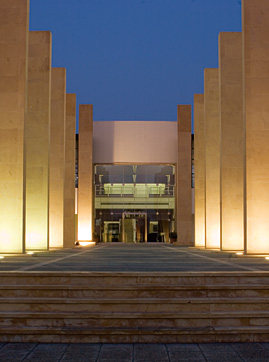 |
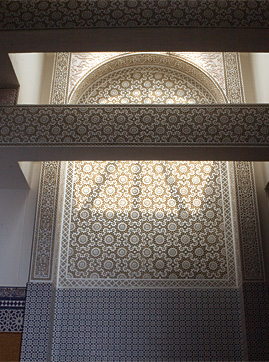 |
| Effat College’s campus in south Jiddah comprises part of the former campus of Dar al-Hanan, the first school for girls in Saudi Arabia, founded in 1955, also by Princess Effat. Left: Pillars line the path in one of the central courtyards. Right: A mosaic pattern decorates the campus mosque. |
While Effat College was the first private college for men or women to open its doors in Saudi Arabia, it has since been joined by a dozen other private institutions of higher education, which now augment Saudi Arabia’s 14 major public universities and approximately 60 other government-run colleges and institutes. Like their counterparts worldwide, the private schools offer lower student-teacher ratios—Effat’s is five to one—and cutting-edge curricula in exchange for tuition fees. (The public university system not only waives tuition but offers students a stipend.) Dean Haifa, as she is known, explains that Effat College takes pride in hiring only full-time faculty. “The students really need every single minute of a faculty member’s time. It’s not just in the classroom and not just 10 office hours a week. The faculty members work on their classes with them and have fun with them. We want to build a culture here.”
Zakia Bahejri, a senior majoring in information systems, remembers her decision to come to Effat College. “The best thing is the environment,” she says. ”When I came to Effat College, I felt I was in a big home.”
Munira al-Saud, who is majoring in kindergarten studies (early childhood education) and serves as president of the Student Committee, agrees. “The faculty makes you feel like they’re your mothers,” she says. “And the students—everybody knows each other. You might not even be in the same major and have classes together, but you sit with different people and they are friendly.”
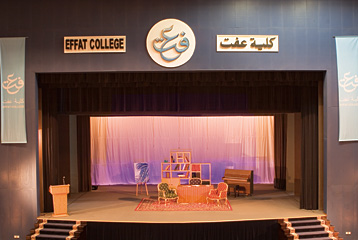 |
| This year, freshmen and sophomores put on the college’s first play, an adaptation of My Fair Lady. Active student clubs include photography, community service and journalism; sports include swimming, basketball, volleyball, badminton, table tennis and tennis. |
Connecting students to the world is another challenge. “Our international perspective is real,” explains Kerry Laufer, vice dean for institutional development and quality control. Laufer is a Swarthmore graduate who has been an integral part of Effat’s development since its earliest days. Students have access to “a wide variety of visitors,” she says, pointing out that recent guest speakers have included Nane Annan, the wife of the United Nations secretary-general, and Liz Cheney, deputy assistant secretary of state for Near Eastern affairs and daughter of us vice president Dick Cheney. In addition, as Saudi Arabia’s accession to the World Trade Organization was approved, speakers from the accession talks visited the campus. At the 2006 Jiddah Economic Forum, Effat College students helped run registration and were admitted to sessions, giving them personal access to leaders and exposure to debates and ideas.
Effat’s new majors, in electrical and computer engineering, are the first in those fields to be offered to women in Saudi Arabia. The programs grew out of a venture with Duke University’s Pratt School of Engineering. Marianne Hassan, assistant dean for new initiatives at Duke, recalls that partnership grew from a visit to Duke by Dean Haifa and hrh Princess Noura bint Turki Al Faisal, a granddaughter of Effat. “It was no coincidence,” Hassan says, “since we have one of five sitting female deans in engineering. Our dean, Kristina M. Johnson, is a world-renowned electrical engineer who specializes in optics. Queen Effat herself was at Duke Hospital in the mid-1980’s, and her family had fond memories of Duke. They felt they could develop a relationship with us.”
This does not mean that Duke is “picking up our program and plopping it down there,” she continues. “We are helping them and facilitating the development of their own program. We’ve asked the hard questions, like, ‘How would we do things differently ourselves if we did them over again?’ We are helping them create a program that meets their needs. Learn from our mistakes and our successes.”
Last summer, Duke hosted a faculty institute for Effat College, and there are plans to set up the Queen Effat Teaching Laboratory, to which Effat College faculty can go each summer to meet with Duke colleagues and discuss their professions.
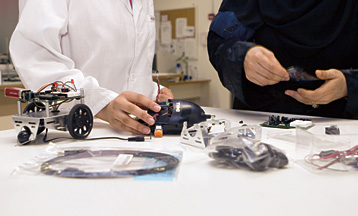 |
| Engineering students demonstrate a robotics project they worked on with Duke University students who visited the college in 2006. |
For the broader community, Effat College also offers non-enrolled women extension classes in creative writing, math, stock-market analysis, business negotiation and strategic planning—as well as a two-year diploma as a Cisco Certified Network Associate.
One afternoon during graduation week, students relaxed over a lunch of okra stew, lamb and chicken at the college cafeteria. At one table, faculty and staff from Saudi Arabia, Canada, Palestine and the us dined together while at another, Elizabeth Bosley, the lone us student at the college, chatted with Saudi friends while listening to music playing quietly from a laptop computer.
Bosley was finishing an academic year at Effat studying Arabic and English in translation. (She is now a senior in Near Eastern languages and civilizations at Yale.) As the only non-Muslim student, she found her experience different from the years she lived in Riyadh with her family as an expatriate resident. “It’s been a lot more representative, I think, of living as a woman in Saudi culture,” she says.
To complement academics, the college is encouraging the arts and social activities. This year, freshmen and sophomores put on the college’s first play, an adaptation of My Fair Lady. Student clubs include photography, community service and journalism; sports include basketball, volleyball, badminton, table tennis and tennis, and the students also make use of a workout room and an Olympic-sized swimming pool.
In 2006, the college won second place in an annual basketball tournament it sponsors. Munira al-Saud recalls that “up until last year, at basketball games, even ones during school hours, nobody would show up. This year we had a game on a Thursday, during our weekend, and the seats were packed. People brought their kids, their cousins —and they brought drums, too!”
“We were like soccer hooligans!” pre-engineering major Dima Ikhwan adds.
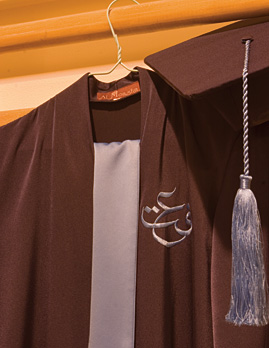 |
| A baccalaureate robe awaits another year’s graduating class. The Arabic logo spells “Effat,” a name that means “integrity” or “uprightness.” |
On graduation night, it was finally time to recognize the years of work.
“Girls! Please sign in with me so we can start the ceremony!” announced Asma Siddiki, vice dean for student affairs, speaking above the excited chatter. As the graduates assembled in their blue robes, the faculty donned robes from their own alma maters, representing many colleges around the world.
Dr. Amal Elyas, a Makkah-born assistant professor of psychology, proudly introduced Sarah al-Khureiji, one of several young mothers among the graduates. “I’ll never forget how the course on the psychology of women really touched her, since she was just a new mother at that time,” says Elyas.
“I’m planning to open a nursery school,” explains al-Khureiji with her daughter at her side, “to offer things that you don’t normally find here that I’ve learned about at college.”
The ceremony started with a dramatic entrance. The wall at the front of the auditorium opened up onto the college’s main courtyard, where the graduating students and faculty marched slowly in a group toward the audience and onto the stage. After a recitation from the Qur’an and a valedictory address, Dean Haifa, wearing the cardinal-red robes of USC, addressed the students in English. Following her, hrh Princess Loulwa Al-Faisal, a daughter of Queen Effat and vice chairman of the college’s board of trustees, added remarks in Arabic.
Along with their diplomas, each of the students received a single red rose. Because Queen Effat had been an enthusiastic and accomplished rose gardener in her lifetime, each new graduate could count as a blossom from her painstakingly tended garden of Saudi women educated in the kingdom.

At the end of the ceremony, balloons descended onto the stage to the strains of Arab music and the students threw their mortarboards into the air and emptied the auditorium to join their guests at a dinner reception.
“It is important for us to see them the minute they come to the college, with their bad English and their poor communication skills, and then to see them before they leave,” reflects Dean Haifa. “I usually sit with them as graduates and so I get to see the big change. Each graduate is a grown-up lady, and she knows exactly what she wants, and she’s communicating it. Before, she didn’t even have a chance to answer the question, ‘What’s your dream in life?’ or ‘What’s your goal in life?’ If you’d asked her then, she would have said, ‘I don’t know.’ When you start looking at that aspect and at the self-confidence she has when she leaves the college, that is true success.”
Nojoud al-Sihli, president of the college’s Marketing Club and a senior in information systems, recalls that “four or five years ago, I was totally different. I was really careless about studying. I was a very shy person at first. I couldn’t say ‘yes’ or ‘no.’ I didn’t speak at all. My mentality has changed and everything has changed. Now I care about my studying. I care about my future. I’m planning to do a master’s. They build your character here. They change you.”

HH Princess Effat al-Thunayyan was one of Saudi Arabia’s most influential 20th-century women. Throughout the country, she is admired as an example of courageous leadership and philanthropy and, most importantly, as a pioneering advocate of education for women and girls. Always dreaming of becoming a teacher herself, she was, until very late in her life, a frequent visitor to the campus of the first school for girls in Saudi Arabia, Dar al-Hanan, which she founded in 1955.
Effat College’s dean Haifa Jamal al-Lail recalls, “I have known her since I was a student myself at Dar al-Hanan. She was a very determined woman. She was focused. She used to come and attend school ceremonies. She was always humble, and always came to talk to the students. She’d pat them on the shoulder if they did well, and if not, she encouraged them to do better.”
“Queen Effat”—it was an informal title—also helped organize and expand the public-school system for girls, as well as the first government-run colleges to admit women. She was an enthusiastic supporter of the many women’s philanthropic societies that often play significant national roles in social services.
Effat descended from a branch of the Al Sa‘ud that emigrated to Turkey in the 1800’s; her father died while serving in the Turkish army. When her widowed mother fell on hard times, Effat was sent to live with her aunt in Istanbul and attended school there. Though funds were scarce, she was an excellent student, and she earned a teaching certificate.
She met her husband, then Prince Faisal ibn ‘Abd al-‘Aziz, viceroy of the Hijaz, in 1932 while she was visiting Saudi Arabia to perform the pilgrimage with her aunt. Prince Faisal made a courtesy call on the two ladies and, as the story is told by one of Effat’s five sons, Prince Turki Al-Faisal, former ambassador from Saudi Arabia to the us, “there was an immediate rapport between them, and he fell in love with her.” They were married soon afterward. Having been raised in Turkey, Effat spoke no Arabic at first, and Faisal spoke no Turkish, so they initially used an interpreter. Effat learned to speak, read and write Arabic fluently, though she always retained traces of a Turkish accent.
One of her four daughters, hrh Princess Loulwa Al-Faisal, who helped Effat found the college, reflects on her mother’s many challenges. “I think that is one of the reasons she was the way she was: She had to deal with things that were completely foreign to her.”
Effat’s youngest daughter, hrh Princess Haifa Al-Faisal, also serves on the college’s board of trustees. She describes her mother: “Everybody called her beautiful, but I think her inner beauty came out more than her outer beauty. She was a dark blonde, with very bright, honey-colored eyes. She had great character and was very strong. She had to be strong to live the life she lived. She was just a giant of a woman, really. She was also wise, beyond anything you can think of. You had to run to keep up with her,” Haifa reminisces. “She had so much energy. When she was going somewhere, she went somewhere. And when she was doing something, she did it.”
“She used to laugh uproariously,” Loulwa recalls. “She was vivacious and alive, vibrant and quick in her laughter. When she laughed, she laughed from the heart. If she got angry, she really got angry and showed it, and then it was over. You knew you could not go beyond a certain point. One look was enough.”
What advice would Effat give Saudi women today? Princess Loulwa answers without hesitation, “It’s the same advice she’s always given. There is no difference between today and then. ‘Educate yourself. Be good mothers. Bring up perfect Saudis. Build your country.’” |
www.effatcollege.edu.sa
 |
Kay Hardy Campbell (www.kayhardycampbell.com), a former resident of Saudi Arabia and writer for the Arab News and Saudi Gazette, now lives near Boston, where she writes about cultural affairs. |
 |
Nicole LeCorgne has been teaching and performing Arab percussion for more than 15 years. She has a master’s degree in ethnomusicology from Wesleyan University and has traveled throughout the Middle East. Originally from New Orleans, she works as a free-lance photographer and percussionist in New York. She can be reached at photography@nicolelecorgne.com. |